
EYESHOT STORMS THE CONTENTLESS CONTENT HORIZON, AUTUMN 2010
Dear Writer/Submission Sender:
Thank you for offering us the opportunity to review your work. We regret
that we cannot publish your submission, as it does not meet our current
needs. Please accept our apologies for this form letter, but the volume
of submissions we receive makes it impossible to respond personally, which
is a total bullshit lie! Honestly, we could easily spend the time reading
your submissions and sending personalized responses. We know this because
we did it for about ten years, but then we got all selfish and tired and
older and wanted to spend our time enjoying life and/or reading The Bros
K etc and were able to see within like six seconds that a submission would
not be something we'd want to post, which made it really hard to personally
respond to a submission if we only read it for six seconds and quickly
scanned its literary DNA and realized we didn't have a match.
With that said, of the recent batch of submissions, we did read two
stories most of the way through, one about a very hairy beast of a dude
and another involving Scottish heather with some illustrations/graphs.
We wavered on these and maybe once would have posted them back when we
posted things more frequently. Everything else we "looked at" more or less
struck us as generally not the sort of thing we're interested in posting,
which means that your submission could be perfectly great for another spot
but for this spot we've tended for 10+ years to post stuff unlike your
stuff, which means we're not posting anything right now, that we're passing
on every single freakin' submission that comes our way, which is insane
for a lit site that runs on submissions, right? It's like a car wanting
to run on liquid gold but not getting liquid gold from any gas stations
and therefore deciding to stay empty and parked forever. Well, not forever.
We'll still look at submissions and hope something like engine-revving
liquid gold comes our way. Until then, we're screwed, at least in terms
of looking like a lit site with anything to offer readers.
Thanks to the submitter who caught the typo in our submission guidelines.
(You misspelled "pulling" in the fourth paragraph of your story. Just sayin'.)
To the Canadian who included the long bio and the "pitch" in his e-mail
and on the first page of the attached manuscript: you really don't need
to do that. The bio is fine to include, generally (few editors really read
them closely), but the "pitch" is totally unnecessary and very much not
recommended.
We wish you all the best in finding a home for your work.
Sincerely,
The Editors
Eyeshot's Irregular Online Literary Reading Service
*
Dear "The Editors" of Eyeshot,
In regard to reading "The Bros K" instead of responding personally to
submissions, let me inform you: Alyosha leaves his life in the priesthood.
It is touching. The final trial is 100 pages too long. Skip it. Other miserable
Russians eke out miserable lives as Russia enters a new era of tyranny.
Rise and repeat.
Although a singular achievement in the Russian canon, I question its
importance over making a direct contact with submitters to your august
publication.
Although I empathise with the ennui or langour you feel after a decade
of selfless one-to-one feedback, "The Bros K" is less important a saga
than "Resurrection" (Tolstoy) or the magical satire of "The Master and
Margarita" (Bulgakov). Might I suggest reading these tomes instead? This
will leave you with more time to respond personally (as droll as your form
response was), with each novel weighing in at 400-500pgs approx.
Although I appreciate you wavering on my Scottish heather piece, I implore
you to widen your literary horizons. Instead of passing on every submission
that comes your way, perhaps publish something occasionally? Magazines
with blank pages are all very well, but it is CONTENT that brings in the
readers!
So here's hoping there's an end to the white, unobtruded-by-text aesthetic
of Eyeshot, and a new era of actual words and pictures! Viva CONTENT!
Good luck, "The Editors"!
With love,
M.J. Nicholls
*
Dear Mr. or Ms. Nicholls,
Thank you so much for your kind, informative, and gently chiding response
to yesterday's form-rejectionary slaughter of all submitters. Thank you
also for giving away the end of The Bros K. Have you read Anna
Karenina? If not, please know that she throws herself under a train
at the end. What's good about such immortal masterpieces is that they withstand
spoilers. Who really cares what happens? It's more about the whole movement
of their worlds, the transparently flowing language, the fully evoked 3D
characters, the wisdom, the heft. I haven't yet read the Bulgakov or Ressurrection,
but they're both toward the top of the queue. There's so much to read,
not to mention submissions from readers of our contentless "web magazine,"
that it gets sort of daunting for us, and surely also for readers who come
to a site expecting to see something and instead see nothing. Maybe that's
not daunting for them at all, maybe it's refreshing, maybe it alleviates
the pressure under which we're all pressed down so steadily, the progressively
encumbering yoke of all those long Russian books and books from other countries
as well, for example The
Instructions by Adam Levin which is a new American novel I own that's
already warped the bookshelf on which it sits thanks to its half-million
printed/bound words. I mean, faced with all these books, including the
remaining 315 pages of The Bros K for me, doesn't Eyeshot have a
sort of moral obligation to provide no content at all?
All I see everywhere online these days is CONTENT. Endless Facebook
status updates (often with links to more content); dunderheaded comments
under articles
comparing McNabb's return to Philly, coupled with Vick's redemption and
Kolb's demotion, to -- what else? -- a Russian novel; old-fashioned news
sites and blogs about news sites (and news about blogs re: blogs on corporate
news site blogs about blogging, or something like that); videos of all
sorts, including every range of human everything, including a nice selection
of Wedding
Present vids, and of course tons of ever-so-tasteful pornography available
at the flick of the wrist; and finally a million zillion lit sites, responses
to which bomb their way down the duotrope.com
screen, not to mention blogs about rejection, helpful/condescending blogs
by literary agents, and blogs by sassy
attitudinal assistants to literary agents, all of whom pretend to live
on whiskey. The last thing we need now is MORE CONTENT.
When we started Eyeshot there wasn't all that much content online that
wasn't unreadably formatted -- marginless stretches of text all the way
across fifteen or at most seventeeen inch monitors, often on pink or pale
green backgrounds. There was content back then but it was effectively contentless
because who could read it? But now that people know how to format content,
oh lord. To quote Mr.
Will Oldham: "I cannot rest with so many singing so many songs and
what a way of singing, their voices are bringing trees to their knees,
with nothing to say when they're speaking." Not to say that trees have
knees or that the content has nothing to say but if the voices we hear
in our editorial capacity here at ye olde Eyeshot don't quite move us to
make them internationally accessible and associate them with all the content
already on the site, then why bother? Maybe contentless lit sites are the
way of the future.
We rode this e-lit wave before it really even began to swell and now
that it's crested and broken and skidded out duneward in a soapy froth,
maybe it's time to recede back to the line where sea meets sky?
That's it! The horizon
is our new role model . . .
Thank you again for the book suggestions and correspondence. We really
miss the correspondence. We used to receive dozens of e-mails a day. Dozens
a day. Not so much anymore, sometimes none. Sometimes an entire day passes
and only leaves fall.
So are you a boy or a girl?
Do you know A.L. Kennedy?
Wait. Are you A.L. Kennedy?!
Sincerely,
The Editors
PS. We decided to add some content below, but if you're interested in
contentless content, simply close your eyes as you scroll down, or click
here: eyeshot.net/___.html.
*
Potential submitters: before submitting,
please consult the Mark
E. Smith Guide to Writing Guide
*

PRAMBLE
BY DARBY LARSON
In Order to form the United States and establish the People of the United
States and Justice, We establish a more perfect Justice. The People of
the Union and Justice, We, to form, in Order to form a more perfect People
of Justice. The United States of a more perfect Union, in Order to establish
the People of We, form a more perfect Justice in Order to establish it.
So, We form a more perfect establishing of Justice just as the People of
Justice formed the United States before us. We the People of a more perfect
Union establish the United States for a more perfect People of it. But
in Order to insure the People of a more established Justice feel okay about
it, the Union, in Order to insure the People of the Union, forms a more
perfect People of the United States. This insures the People of the Union
feel insured and a more perfect Union forms. The United States and the
form of the Union, to establish Justice, forms a more perfect Union. Meanwhile,
the People of the United States establish a more perfect People. The People
of the Union, to insure the form of a more perfect Union, establish Justice
in Order for the People of the Order to establish the Union. To insure
the United States can establish the form of a domestic Justice, the establishment
of a more perfect form of Justice insures the United States in Order to
establish a more insured Union. So the United States, a more perfect Justice,
and a more domestic Union are established. And the United States, to insure
domestic form, establishes a more perfect form of itself and the Union
of the United States forms a more perfect insurance. The Union, to form
a more perfect United States, establishes, in Order to establish Justice,
a more perfect and insured form of domestic Tranquility. The form of a
more perfect and domestic Union establishes a more perfect Tranquility,
a domestic Union, and an established Justice. As long as the established
Tranquility feels insured, the form of the Union, in Order to insure a
domestic Union, reflects a more perfect Tranquility, and everybody's happy.
So the domestically insured Union forms a more perfect Justice while the
domestic Tranquility, in Order to form a more perfect Union, establishes
a more insured Order. All of this is to insure a more perfect Tranquility,
a more domestic Union, and a more insured Justice. This establishes Justice
and insures domestic Tranquility. And that Tranquility, to provide for
a more perfect Justice, forms a domestic Union and a more perfect means
of establishing insurance. To establish Justice and to provide for a more
perfect Union, insure a domestic form, and form a more perfect Tranquility
to provide for. The Union and a more perfect form to provide for and insure
domestic Tranquility, and establish a form of Justice more perfect than
before. Tranquility, to provide for it, and a more perfect Union to establish
and insure a domestic Justice everyone can agree on. The form of the Union,
a more perfect one, and the Tranquility, the domestic one, insured for
it. And the domestic Justice, insured, provides for the common Union and
a more perfect Justice established. The common Tranquility across the Union
is to insure the more perfect and common Tranquility is provided for. Establish
Justice and provide for a domestic Tranquility and a more perfect Justice
for the common Tranquility. The common Justice is established to provide
for and insure the commonly established Tranquility. Or, rather, a more
perfect Justice. Insure the Tranquility provides for the established Justice
and the common, domestic Union provides for the domestic Justice. A more
perfect and common, domestic insurance for the Union and a more perfect
Tranquility. A more perfect defense provides for the established Union
as well as the common Tranquility. The common defense provides for the
Union which establishes Justice, insures a domestic common defense and
provides for domestic Tranquility. Insuring domestic Tranquility is the
common defense provided for and the established Justice insures it also.
The common Union and the common defense are provided for to insure domestic
Tranquility and to insure the Union establishes Justice. Insuring the Union
establishes and insures the common defense is provided for by the Union
itself along with the common Tranquility of Justice. The established Justice
insures, provides for the common defense of, and promotes the domestic
Tranquility for the commonly insured. Tranquility provides for Justice
while Justice promotes and insures Tranquility, and establishes the common
defense of it. To provide for and promote the common establishment, the
domestic and the insured, Tranquility promotes itself to Justice and the
established defense of the insured. The common defense of the domestic
Tranquility is to establish Justice and promote the common defense to provide
for the insured establishment. Promote the common Tranquility before insuring
Justice for the already provided for. That's common sense. Tranquility,
Justice, provided for and promoted to establish the common defense. Insure
domestic Tranquility, provide for the common general and the defense of
it, plus Justice. Promote the general and provide for the domestic Tranquility
of it. Justice, to provide for it and the common general, to insure the
general is promoted, to defend the common Tranquility and the domestic
commonality across it. The general and the common Justice, to insure a
domestic providing for it, to provide for the common defense of it, to
promote the general, and to insure Justice is the common defense of it.
Justice and Tranquility, the common defense, the domestic general, all
promoted. The common general, the domestic Welfare. To promote the Tranquility,
the common defense, and the domestic Welfare. This insures the common defense
insures the general Welfare and the domestic Tranquility of it. Insure
the common Welfare and the defense of the provided for Tranquility provides
for the general and the domestic and common insurance. The common Tranquility
and the general defense and the common Welfare, the general. The common
defense provides for domestic Welfare while the general Tranquility promotes
the domestic defense for the general defense it provided Tranquility to.
The common Welfare, meanwhile, insures the common defense, provides for
the general Welfare and promotes domestic insurance. To secure the insurance
provided for by the common defense securely defended by the general Welfare
of Tranquility. To secure the domestic commonality is a must. The Welfare
and the common Tranquility provided for by the promoted defense and the
general domestic should provide for the promotion of the general Welfare
securely. As long as the domestic Welfare and the domestic Tranquility
are secured, the common defense and the common Tranquility will be domestically
provided for and secured. Promoting the general Welfare is top priority.
Providing for the common defense and securing the general Tranquility in
defense of it. Not to mention the securing of the Blessings of it. To promote
the Blessings of it. Securing and providing for the general Welfare, the
common defense, Tranquility, and the Blessings. Defend the security of
Tranquility by providing for the promotion of the common Blessings. Meanwhile,
the general Welfare will have been provided for just as the common Tranquility,
in defense of the Blessings, will have been promoted to secure the Blessings
and provide for the common Welfare. The general Blessings and the common
Blessings, the common defense and the Welfare of it. Tranquility, providing
for the common defense, secures the Blessings and promotes the general
defense. Provide for the common defense, the general Welfare of Liberty,
securely, the common Welfare and the security of the general Blessings
of Liberty. The Welfare and the common Liberty secures the Blessings of
the defense of a general attitude. Basically, promoting the Blessings and
securing Liberty are part of the common defense provided for by the Blessings,
in hopes that the defense of the common and general Welfares agree with
each other. Lest providing for the Blessings of Liberty becomes the securing
of the general Welfare and the general Welfare sees fit to provide for
the common defense of it. To ourselves, the Blessings appear common, so
the promotion of the general Welfare is secured. The Blessings of Liberty
to ourselves is secure. The common defense is secure, and the Blessings
are promoted to ourselves and the general security of our Welfare. The
common Blessings to ourselves feel secure and common, the defense of the
Welfare to ourselves feels promotable to ourselves. Ourselves are the common
defense promoted by the general Welfare, secured by the Blessings of a
common Liberty to ourselves. The common defense, the general Welfare, the
promoted Blessings, ourselves, of Liberty. The Blessings of ourselves feel
common. To secure Liberty, the general Posterity of the Blessings, and
the Welfare of it, along with the general defense of our Posterity of Welfare,
a more general promotion is secured. So Liberty, a more defensive Welfare,
and the Blessings of Liberty. Liberty, to secure the Blessings of our Posterity,
in general, a defense of our Posterity from itself and the promotion of
Liberty promote a more defensive security. The promotion to ourselves and
our Posterity are a defensive Liberty, a promoted general Welfare, and
ourselves to secure and keep secured our Posterity of the Blessings of
Liberty. The general Welfare promoted, our Posterity secured by the Blessings.
Do ordain and secure the Blessings of Liberty, ourselves for the Posterity
and the general Liberty, plus Welfare. Promote the general and ourselves
for the Blessings and the Liberty of it. Welfare, to ourselves and the
general Posterity, to secure the general Welfare, to promote the Posterity
of Liberty and the Blessings of Posterity. The general Welfare and the
Posterity of Welfare, to secure the Blessings and the ordaining of it to
ourselves and for Posterity. Welfare and Liberty, the Posterity promotion,
the general Blessings, all promoted. The Liberty of Posterity, do ordain
and secure the Blessings of Welfare. To secure the Liberty of our Posterity,
do ordain and establish the Welfare for the general Blessings to ourselves
and our security. The Blessings to ourselves establish the ordaining of
the Welfare and its generalities. Of Liberty, to ourselves, our Posterity,
Blessings secured, do ordain the Welfare to ourselves. Secure the Blessings.
Our Posterity and the Liberty established by the Posterity of our general
Welfare. Our Posterity ordains and does. Ourselves and our secured Blessings
establish the general Welfare of our Posterity. Secure the Liberty before
the Posterity establishes the Blessings to ourselves. Do ordain and establish
the Blessings to ourselves and our Posterity of Liberty. And here we have
the Blessings of this Constitution, to ourselves, and the securing of Liberty
in order to do the ordaining and establish it. Although the Welfare is
securely established of Liberty, ourselves and our Posterity do ordain
the securing of this Constitution of Liberty and Welfare. Our Posterity,
established by this Constitution, constitutes the Blessings that established
it to ourselves and our Posterity. Do ordain and establish this Constitution
for the established Blessings of Constitutions everywhere. Of Liberty,
securely, establish ourselves and the secured Welfare of Liberty. Establish
our Posterity and this Constitution securely. To ourselves, this Constitution
of Posterity establishes Blessings and Welfare. Establishing this Constitution
to ourselves secures the United States of America from ordaining the doing
of the securing of Blessings to ourselves and our Posterity. The Constitution
of the Blessings of Liberty secures this Constitution for the United States
of America ordainly. Our Posterity, our Liberty, to ourselves, securely,
this Constitution of Liberty, do ordains and establishes Liberty and Posterity
to ourselves, to the Blessings, to a new Constitution, established for
the United States of America. Establish the United States of America and
secure its Blessings, its Constitution, and its Posterity. Do ordain and
establish the Blessings of the United States of America.
*

A CALL FOR DISCLOSURE OF POTENTIAL CONFLICT OF INTEREST
Note to everyone: if you're a writer or reviewer and you're writing
about a book by someone you know or have some association with via other
friends or an agent or publisher or if you're writing something to please
someone with the hope that this person might in turn scratch your back
too, please consider revealing this association at the beginning of your
review etc, the way they do in the medical field wherein physician authors
must include a disclosure statement that reveals potential conflicts of
interest. We have compiled a rogues gallery of the untrustable based on
blurbs and/or excessive promotion that in no way seems to reflect a realistic
reading experience. Selling books is important, sure, but when hype seems
too high, it underwhelms the entire endeavor, which ideally is about getting
at the truth, meager sales bedamned. If you have a goodreads account, add
a "potential conflict of interest" shelf. If you hype something on facebook,
tastefully mention that someone is your friend etc when you hype. Is that
too much to ask? Does it seem naive, not taking into account that most
promotional activity, especially promo activity online in the so-called
indie publishing world, but also of course so often seen on the back of
major publication copies, is inherently hyperbolic and untrustable?
*

NEW ADDITIONS TO YE OLDE READERLY RESONANCE CHAMBER
For more impressions of new and old books, click here.
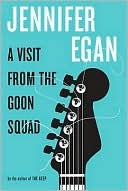
"VISIT FROM THE GOON SQUAD" BY JENNIFER EGAN
Impressions by Sallie Hooterall
Liked the PR/General chapter. Liked a description of old tattoos on
saggy flesh. Liked the big fish caught in the East River. Really liked
the sudden jumps 35 years into the future! Otherwise, not my bag, ultimately.
Doesn't really involve music (despite cover etc) and when it does involve
music it's from a troubled bidness or hackneyed adolescent "punk rock"
perspective (overriding question: when does a fake mohawk become a real
mohawk?!). Imagine buying a book touted as being about unicorns, with a
lovely unicorn on the cover and reviews re: unicorn content, but then when
you shell out $$$ and read it its unicornishness is like no more than 10%.
The mock-DFW footnote-heavy journalism section irritated me (maybe also
because I read it on the 2nd anniversary of DFW's death). The power point
slide pages were formally clever but that's about it (also: it's Foxy not
Foxey Lady -- intentional typo?). Otherwise, was always aware I was reading
creative writing/fiction, a different feeling from reading something that
feels like lit. Characters seemed unappealing (erection-laden men, many
of them violent) and didn't deepen into 3D humanity for me. Not much (skim
or even soy) milk o' human kindness, generally. Attempts for language-y
exactness consistently triggered distraction and zone outs in this reader
(eg, a cascade of long hair described "like a shattered window" -- oh wait!
Might the "shattered" bit relates to the structure? Or, um, who cares?
Does it matter in the slightest?). Speaking of structure, it didn't do
it for me and didn't really seem particularly original. Few, if any, stretches
of insightful essayistic exposition and extended description (what I tend
to like). Thematic stuff re: time seemed pretty basic (guess what? things
change with time: poignancy alert! also, did a character named Chronos
really
get mauled by a lionness?!) -- and beyond that I detected few suggestions
of other subtextual stuff, maybe because my imaginative/generous reader
sensors mostly switched off after the first 50 or so pages? (Have people
really compared Egan to DeLillo?!) It's a well-loved book -- and even called
"pitch perfect" in the NYT Book Review -- but I guess my ear's attuned
to the music of other spheres. So be it if I'm outta fashion. As Mr. Bowie
says re: the goon squad, beep beep!

"THE LEGEND OF THE HOLY DRINKER" BY JOSEPH ROTH
Impressions by Lennon Moore
A feelgood alcoholic wish-fulfillment happy-ending hybrid of
chilled-out Gogol and irresponsible Norman Rockwell. Makes you wanna down
a few Pernod and visit cafes where ladies for hire hang out. A short story
more than a novella. The last thing Roth wrote. Not really on the same
level as his masterpiece, The Radetzky March, but a nice lil' literary
sumptin' sump.
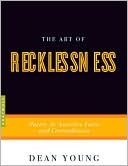
"THE ART OF RECKLESSNESS: POETRY AS ASSERTIVE FORCE AND CONTRADICTION"
BY DEAN YOUNG
Impressions by Throop Roebling
Recommended manifesto re: primitivism, Navajo poems, Romanticism, Rimbaud,
Duchamp, Dada, Surrealism, the radioactive core of inspired work, on and
on. Covers too much ground to summarize. Formal swerve matches content.
Wonderfully composed and inspiring, even if it sometimes seems intentionally
excessively overecstatic/associative. Too many page corners turned down
to count. More LOLs than expected for something so densely crafted (albeit
consistently skeptical of the sterilizing codifications/commodifications
of art into craft). Every page has 3+ epigrams: epigraphs waiting to happen.
Eat this succulent choirpreach peach of literary enlightenment and revel
in the glorious eros of errors.
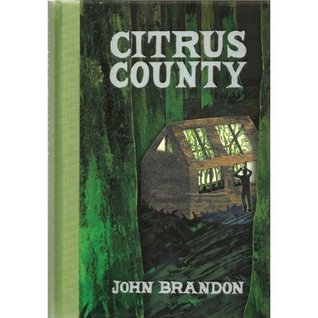
"CITRUS COUNTY" BY JOHN BRANDON
Impressions by Sallie Hooterall
An admirable short novel that seemed to do what it wanted to do just
fine, I guess. Mid-level misanthrophy. One minor LOL for me re: the girls
basketball team. Occasionally precious A+ "creative writing 101" descriptions
("she smelled like freckles"). Felt like an overextended short story? Monotextured
(that's a really wonky way of saying it maintains a similar tone/pace/approach
throughout). A "terse novella" maybe would have worked better? Synonymous
piling up of phrases too often made me aware I was reading contemporary
literary fiction? Too often a little too cutesy for me, like it aspired
to be turned into a movie by whoever did "Little Miss Sunshine"? Too often,
overall, I was aware I was reading fiction, aware of the dynamics of the
story, the inevitablility of old-fashioned character change, instead of
seeing/believing in the characters? Maybe the characterization needed reemphasizing
sometimes? Likability wasn't as much an issue for me as not really believing
in the characters or the story because of the prose/tone/syntax? Sort of
fell somewhere between Tinkers and Netherland for me in terms of readerly
"enjoyment." By which I mean I can appreciate and admire passages, descriptions,
scenes, but there's something in the helices of its literary DNA that didn't
exactly twine with my readerly genes? Here's a sentence I can pull to support
what I mean: "Some kids were just kiss-asses and they couldn't help it,
no more than one can help being Samoan or allergic to celery." As a reader,
I can't help being sort of like a walrus, whereas this book can't help
being more of a manatee. We can swim together in the same waters but can't
quite breed, you know what I mean? I can't help prefering another sort
of fiction, something a little less "sane" in form and content, something
maybe a bit more individuated at a sentence level? Also, I've always had
trouble reading about kids. The few books involving young adults I've loved
are way crazier than this one, with way more thematic HEFT: The Notebook,
The Proof, The Third Lie, or His Dark Materials Trilogy. This
one's not really my bag, ultimately. So I guess I should say something
like sorry, it's not you, "Citrus County," it's me . . . you're readable
and professionally executed and, physically, a beautifully designed book,
plus you include a great line about a sky of clouds like the aftereffect
of an exploded sun bomb, but I just couldn't get beyond something in your
tone and tactics re: these yearning (default emotion of contemporary literary
fiction), confounded, essentially good-hearted yet ultimately mostly misdirected/parentless
(or nearly parentless) kids and one of their young teachers etc, and so
I wish you all the best in terms of finding a devoted readership.
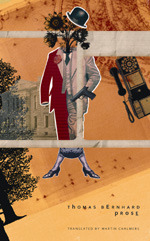
"PROSE" BY THOMAS BERNHARD
Impressions by Zosima Vix
A story in this early collection (1967) is titled "Is It A Comedy? Is
It A Tragedy?" That's been the question for me through all the Bernhard
I've read. I laugh a lot. But I laugh at rants about suicide and governmental
ineptitude and general hatefulness. It's not American humor at all. It's
not English humor. It's that tricky Germanic/Kafkan humor that's not really
"funny" but strikes something in you that makes you make a noise like laughter.
Todd Solondz does that, too (just saw "Life During Wartime"). Ultimately,
the comedy?/tragedy? story (this isn't really a "spoiler") states that
it's a comedy, although there's nothing particularly "funny" about a crossdresser
revealing that he pushed his mother into a canal 22 years and 8 months
ago. A few other stories overtly mention "comedy," something I think pretty
much lacking from other books, even "hilarious" ones like Woodcutters.
Regardless, intermittent ocular application of Bernhard's wholly individuated
style/sense -- no matter early or later (usually considered better) Bernhard
-- makes me appreciate my comparatively well-adjusted consciousness/life.
I need to read this again, and since the stories are short compared to
his 155-page, one-paragraph rants, I might be able to read a lot of it
again before the night's over. An OK intro to his stuff (better to start
with Woodcutters and The Loser). Seemed a little like
story-length versions of the page-long bits in The Voice Imitator
-- that is, the stories are humanized elaborations of crimes you might
read about in the paper, rather than the intricate thoughtwork of superobsessive
geniuses. A nicely constructed hardcover book -- cool cover, red boards,
solid binding -- from a small press.
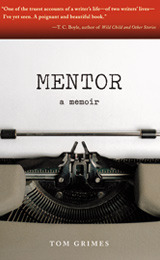
"MENTOR" BY TOM GRIMES
Impressions by the Eyeshot Editor
Recommended for anyone who had any experience with Frank Conroy and
wondered what it might have been like to have known him better. For everyone
there when he was the director, he changed lives, definitely, by inviting
folks to spend two years living like writers.
I once sat across the table from him and tried to argue about the importance
of exposition when he quoted Henry James -- dramatize, dramatize, dramatize!
-- and he waved a hand in the air as though calling for rescue and countered
with "calumny!" (I looked up the word when I got home and e-mailed him
to apologize and he responded that I needn't worry and that he appreciated
my presence in his class, a phrase I'd intermittently savor and re-use
in my own classes a few times). I loved the old dude pretty much immediately,
but also, like everyone, was slightly scared of him, but in the way I was
slightly scared of the old prep school teachers I had who were unpredictable
but always entertaining and brilliant.
It's clear I can't write about this book without improvising my own
condensed Frank memoir, which is probably a testament to this book's goodness:
the meaning/music of it, the co-created thematic stuff, is the thread of
a reader's recollections (re: Frank, The Workshop, Iowa City, Connie, Charles
D'Ambrosio, et al) nicely tangled up with everything Grimes relates.
I loved when Grimes repeated Frank's thing about "sensing an intelligence
pulse through the page" (that's something I remember Frank saying -- a
similar quote from the book would be this: "A reader . . . must feel the
continual, but unobtrusive, pressure of the writer's soul behind every
sentence.")
But this book also isn't really all about Frank.
The first part of the book I found sort of centrist, tonally, despite
horrific bits about the author's sis. I kept wanting things to bust out
formally, tonally, somehow, but then a bit of screenplay midway seemed
really sort of not like the right move to me. Which didn't matter much,
though, because soon I dogearred some pages where the prose lost all the
self-conscious writerliness early on (there's a description of lines in
a man's face -- the simile escapes me, but it was one of those lines that
makes you aware you're reading "creative writing" instead of something
necessary/inspired/good) and just said what had to be said: "But for me
writing is a necessity. I exist in sentences. I forget my sense of failure.
I forget time. I forget that I'm aging. I forget that one day I'll die."
When the writing seems like it's as honest as possible, it's really pretty
excellent.
This one starts well, sags some, but then improves as the author loses
his shit a bit mid-career after experiencing ye olde Literary Poignancy
Lesson 101 (ie, seriously raised expectations, semi-dashed hopes) and as
Frank gets sick. Good, also, to read Mr. Grimes' eulogy from the memorial
service. I was impressed and moved when I heard it in person -- that's
why I preordered this book, not having read anything else he'd done.
Definitely recommended for the memory-lane waltz (if applicable), but
also recommended for anyone interested in an honest, well-constructed,
fairly bullshitless representation of an ambitious, semi-tortured variety
of writerly reality. The sort of book that makes you keep the faith and/or
reinforces respect for the peculiarly important, intermittently maddening
endeavor of reading and writing.
Potentially of interest: some letters from students that were compiled
and sent to Frank before he died were anonymously posted here
-- might make for excellent supplementary reading.
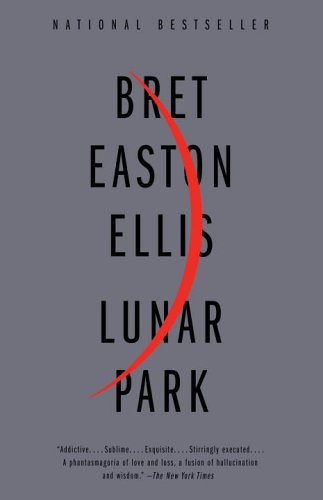
"LUNAR PARK" BY BRET EASTON ELLIS
Impressions by Alix Hadji
The first half was real funny, tons of LOLs, totally audacious comedy
masquerading as autofiction masquerading as Hamlet-referencing horror.
But then the language and insights and humor fell away in favor of just-the-facts
one-line-per-paragraph plot execution. Lack of plot in BEE's first three
novels totally works -- but this one's self-consciously consumed by its
outline (his narrator even refers to the "writer" who would otherwise fill
out certain spare plotty bits). Ultimately, a totally audacious, intentionally
uneven, easy-reading take on one writer's serious daddy issues (and some
good thoughts re: writing, fame, drugs/addiction, kids, and a very funny
bit re: bachelorhood etc). A bit of a disappointment for me, but an excellent
example of writing that refuses "to embrace the mechanics of East Coast
lit conventionality" while nevertheless being published by Random House's
high-end literary outfit. Also interesting in terms of how it joyously
loads up a tall sacrificial pyre of supernatural, irreal, and metafictional
aspects instead of observing the rule to only introduce a single fantastic
element and keep everything else realistic, a la Kafka. But in the end,
even if pulling off the mask of good writing thematically associates with
pulling off masks of fame or notoriety or layers of emotionlessness related
to one's angry upbringing, it didn't make for much more than stripped-down
reading that made the author's possibly earnest revelations re: family
and father and self etc -- no matter how "hard won" or serious -- seem
as cheap to me as the intentionally unwriterly language. But, for fans,
the first chapter or so where he summarizes his career is deliciously funny
and pretty much worth the sticker price.
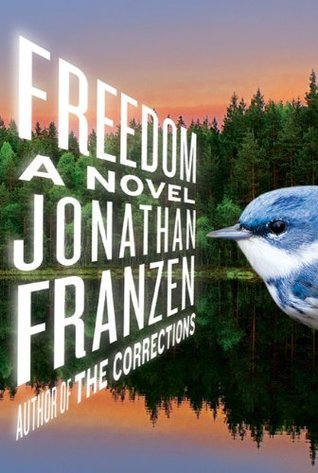
"FREEDOM" BY JONATHAN FRANZEN
Impressions by Lennon Moore
Totally felt Tolstoyan, specifically the triangulation of characters
and flowing transparent prose that's nevertheless never spare. Criticisms
(see below) seem sort of nitpicky -- yet imperfections are possibly absolutely
a necessary part of what this one's about -- considering how alive the
characters seemed, how they spanned time, how they engagingly struggled
with personal/political imperfections and therefore seemed to squirm inside
the story, asking me to open the book and get back to them when its covers
were closed. Not really about something so general as "how all Americans
live today" so criticisms re: the book's (primarily) white educated privileged
characters not accurately reflecting the full range of contemporary America
don't make so much sense to me. More so, maybe it's about taking sanctuary
in one's struggles with imperfections of self and world? Relevant related
quotes: "Her very difficulty created friction, and friction led to satisfaction"
and " . . . needing a more dully and enduringly discontented situation
to struggle against and fashion an existence within"? Maybe elements of
potential discontent are embedded for readers to discover, like the opposite
of (spoiler alert!) a gold ring in a turd? (Note that attainment of a superficially
perfect bedmate doesn't turn out fundamentally perfect and that imperfect/inoperable
truck parts are valued for their weight more than their function/perfection.)
Despite imperfections (or, more interestingly, in large part because of
them), I read this in 100-page stretches, progressively awed/daunted by
ever-increasing dimensions of character and theme (again, maybe aided/abetted
by difficulties with these characters and themes), the evocation of its
world, the relevancy to the so-called real world, the forward-rushing push
and clarity of lofted effortless language, the sense of spending time immersed
in the product of a very talented writer's fulfilled ambition. At times,
especially before what felt like an extended lull starting around page
440 or so, I sometimes thought this was a nearly perfect conventionally
structured novel -- similar to Anna Karenina in the way it patiently
waltzed from character to character, situation to situation, with each
new turn gracefully creating the sense of passing time, of life lived offstage
while it focused on a certain set of characters/situations. Much shorter
books have seemed twice as long. Few books seem quite as alive. Its simple
title -- a single word loaded with complexities/dimensions -- elegantly
represents the whole (it didn't seem to me to show up as much as some reviews
say -- but maybe it'd've been ideal to have only used "freedom" once?).
A great novel, therefore, laced and studded with imperfections/difficulties
in such a way that lets readers fashion a satisfying/struggling existence
within it among living inhabitants who rise from nothing more than the
really artful application of print on paper. I also really liked that one
of the surliest characters reads Thomas Bernhard, another writer whose
constantly undermined idealism re: humanity is often misconstrued as simple
misanthropy.
Some criticisms, difficulties, potentially intentional "imperfections":
Parts of the final 120 or so pages (excluding the last 20 pages) maybe
lulled a bit too much for me, with too much history about Walter and Patty's
parents? -- a common technique: layer the duller stuff in toward the end
before a big scene so the big scene seems even bigger. Joey's summertime
employment seemed not so plausible, albeit necessary for the story and,
well, at least he didn't get tragically shipped off to Iraq etc. An encounter
with a West Virginian racist redneck seemed too obvious? Starry-eyed lovers
so often become star-crossed in literary fiction -- the demise of a happy
character (ie, someone at peace with how they go about struggling with
the complexities/difficulties of the world?) seemed semi-predictable and
too sudden? Sections of autobiography, especially the latter bits, barely
differed from the regular narrative voice and therefore seemed hard to
believe?

"THE RED AND THE BLACK" BY STENDHAL
Impressions by Sallie Hooterall
Ooof. What can I say? It's a POV tilt-a-whirl, totally melodramatic,
wasn't really extraordinary for me in terms of translated language, themes,
images, characters (Julien and Mme. de Renal are mostly characterized to
the point of excellence, but otherwise?). It dramatizes to the point of
ok-already exaggeration the freaked-out/constantly disingenuous game-playing
feints and parries of capricious young lovers. Very little love was created
in this reader for these "changeable" characters, sadly, no matter how
apparently hot Mme. de Renal and de la Mole may have been circa 1830. A
few memorable scenes about 100 pages into it like when Julien smooches
the arm of the former, a few memorable scenes toward the end when things
get wild with the latter, but then it seemed to end abruptly and unbelievably
(did Mathilde really obscond with his freakin' head?! How exactly did she
pull that off? Not very clear, Monsieur Stendhal -- I read those lines
a dozen times!). Thematic schtuff re: appearances/authenticity, the stylish
fakery of civilization etc, didn't really make me see the world in a way
I actually believed in, didn't enhance my perception etc -- it came off
like more of a sarcastic narrative stance than a satirical one, maybe because
there's no character the reader can really rely on. But mainly I'm relieved
to have finished. A period piece, one of the first novels to track the
psychological switchbacks (ie, thoughts) of its characters, but still,
it was sort of a slog for me (thanks in large part to the constantly switching
POV), with maybe a dozen dog-earred insights/images over 509 dense pages,
two or three quick LOLs, and an awesome parenthetical authorial intrusion
re: arguing with his editor about the merits of including political discussion
-- the author is against it, saying it's like a pistol shot during a concert
that doesn't harmonize with any other artistic instruments, but the editor,
unfortunately, wins out. Also didn't love the heavy-handed/ironic Julien/Christ
connection (carpenter's son, etc). With all that said, there was something
comforting about returning to the semi-frustrating world within this little
old yellowed paperback every day for about a month. I'll probably try "The
Charterhouse of Parma" sometime before 2012, but doubt I'll ever make my
way through this one again.
*
LAST SEASON
The July-August installment
of Eyeshot included a
story called "Last Days" by Mike Ingram, an "essay"
by Kevin Hyde "about" Robert Bolaño, seven terrible good
reasons to quit your job and work on your novel, a collection of impressions
of a few Brat Pack books, the
first installment of Q&A with an
aluminum shark, and not much more!

archive
- about - submissions
|
|
|

